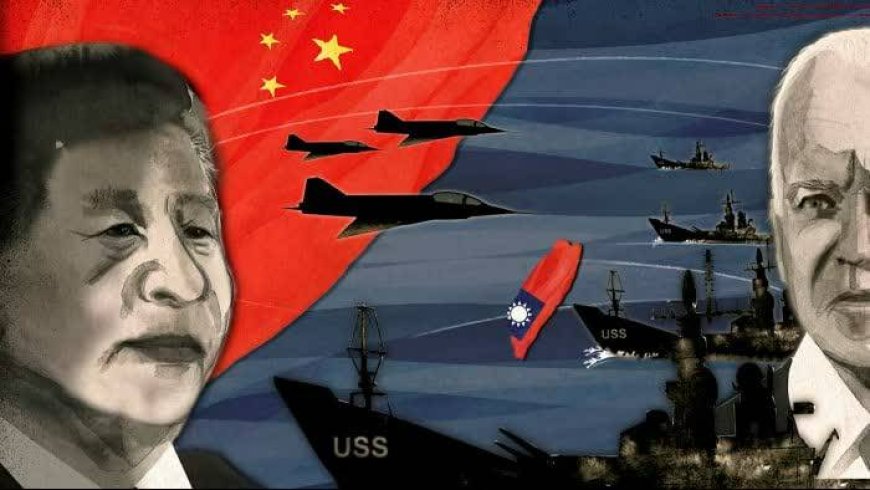Taiwan Crisis: China and US Conflict on the Brink of War?

By: N. Daneshvar
The recent presidential election in Taiwan has resulted in the victory of a political party, the Democratic Progressive Party (DPP), that is not traditionally aligned with the advocacy of Taiwanese independence from mainland China. Despite the DPP’s victory, it only garnered 40% of the votes, with the remaining 60% going to candidates who do not advocate for Taiwan's independence. Nonetheless, this lingering, albeit unsuccessful, push for Taiwanese independence continues to generate tensions within China's domestic and foreign policy landscape, rendering the Taiwan issue a central point of divergence between China and the United States.
It is noteworthy that China categorically rejects the prospect of Taiwan becoming an independent country. This stance is not merely that of President Xi Jinping but is firmly enshrined in the Constitution of the People's Republic of China. Amid these ongoing challenges, recent reports have emerged that China is conducting numerous military exercises in the eastern waters surrounding Taiwan. Furthermore, informed sources have suggested a high probability of China attacking Taiwan in early June.
The Associated Press (AP) news agency has reported that the Eastern Theater Command of the Chinese People's Liberation Army has initiated a 2-day ground, naval, and air exercise titled "Joint Sword-2024." According to the Chinese military spokesperson, this exercise serves as a "strong punishment" for the "separatist actions" of Taiwan's secessionist forces. Notably, this exercise, which involves the practice of encircling Taiwan, commenced merely 3 days after Lai Ching-te's inauguration as the new President of Taiwan, whom the Chinese government has labeled a "separatist."
In this regard, the Chinese People's Liberation Army has issued a statement declaring that "this exercise is a great punishment for the separatists who seek independence, and it is also a serious warning to foreign forces, including the United States, which interfere and take provocative measures." Furthermore, the spokesperson of the Chinese Ministry of Defense has emphasized that the new leaders of the Taiwan region, by openly promoting a "two-state approach" and attempting to "gain independence" with the aid of foreign powers, have officially posed a serious challenge to the "one China principle." In the meantime, the spokesperson warned that these actions have placed the Taiwanese people on the threshold of dangerous war conditions.
The authorities in Beijing have consistently regarded the island of Taiwan as an integral part of China itself. Consequently, it has staunchly opposed any actions perceived as secessionist in nature. The recent military exercises conducted by China are a direct response to the purportedly "provocative" actions that transpired in Taiwan following the inauguration of its new president.
The Taiwan challenge can be traced back to the aftermath of China's civil war and the establishment of the communist government in Beijing under Mao Zedong. As the defeated Chinese nationalists, led by Chiang Kai-shek, fled to Taiwan, establishing a government in Taipei, they forged a lasting alliance with the United States during the Korean War, which has solidified Taiwan's enduring challenge to China's claims of sovereignty.
Taiwan has persistently relied on US military assistance to bolster its defensive capabilities. This support has emboldened Taiwan to undertake measures perceived as antagonistic by China, which has in turn prompted Beijing to conduct military exercises and maintain a state of readiness to counter any potential military action or preemptive attacks. The strategic location of Taiwan within the South China Sea has accorded it immense geopolitical and geoeconomic significance for both China and the global economy. As mentioned earlier, Beijing considers Taiwan an integral part of its territory and is highly unlikely to relinquish its claim to the breakaway island. Consequently, it will likely prepare for any eventuality, including the possibility of military action, to preserve its "One China" principle and, above all, maintain its regional hegemony.
Political analysts and experts posit that Taiwan represents a "red line" for China. As long as the United States refrains from crossing this line, a direct confrontation between the two powers is unlikely. However, some speculate that if China's pressure on Taiwan translates into concrete military action, it could mark a significant setback for the United States and its allies, following their utter failures in Ukraine and Palestine.
Conclusion
The Taiwan question remains a complex and volatile issue with no easy solutions. China's determination to maintain its sovereignty over the island is unwavering, while Taiwan's desire for self-determination continues to fuel tensions. The recent escalation in military exercises and diplomatic rhetoric underscores the urgency of finding a peaceful resolution to this geopolitical flashpoint.













































